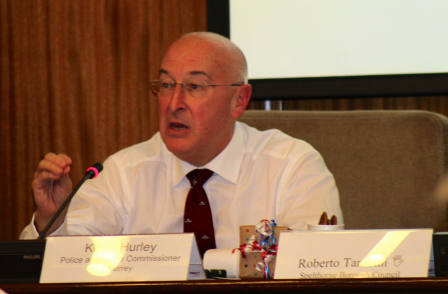
-
Met secretly seized Sun phone records purely to defend its own reputation
-
Use of RIPA against journalists will silence public sector whistleblowers
-
Seizure of journalistic material must be approved by a court
-
Sign Press Gazette petition and protect the public's right to know
A former Met Police commander with 30 years' experience in the force has publicly backed Press Gazette’s campaign to stop the police spying on journalists.
Kevin Hurley was elected as the Police and Crime Commissioner for Surrey in 2012 and he has urged people to sign Press Gazette’s Save Our Sources petition. This calls for urgent action to stop public authorities using the Regulation of Investigatory Powers Act to secretly obtain journalists’ phone records and so expose lawful sources.
The campaign was launched in response to the revelation earlier this month that the Met obtained the phone records of Sun political editor Tom Newton Dunn and The Sun newsdesk in order to find and sack three officers accused of leaking information about the Plebgate affair.
Hurley said that RIPA was originally intended to “protect our national security and economic interests” but instead had been used by the Met to “compromise a journalist's sources by the back door and without external scrutiny”.
In a guest blog for Press Gazette he has made an impassioned plea to protect whistlelowers and the free press in the wake of Leveson Inquiry, abuse of RIPA and the ongoing hundred-strong police investigaiton into journalism.
He said that The Sun phone records were obtained “for no reason other than to defend the reputation of the Metropolitan Police Service as its leaders struggle to deal with a bitter but ultimately trivial political spat”.
RIPA requests for phone records are approved internally by police officers themselves. They are supposed to be used to detect or prevent criminality in a proportionate way.
Hurley said of the Plebgate RIPA requests: “No lives were at stake. No money had changed hands. Indeed the CPS declined to pursue prosecutions because they believed the constables in question would ultimately have been found by a jury to be acting in the public interest.”
He said: “Of course the police and other agencies should have powers to pursue criminality, corruption and abuse within their own ranks and across society.
“However, this must be done with the most careful regard to the wider public interest, something that we as Police and Crime Commissioners are here to represent.
“Seizing journalistic material is a serious decision indeed, one with significant consequences for our country as a whole. Such a move must be subject to debate and challenge in court if it is to have legitimacy.”
Hurley said that such use of RIPA will silence legitimate public sector whistblowers and make reporters “think twice about pursuing stories in the police, armed forces or other public bodies”.
He said: ”I think some bad eggs are probably sleeping a lot better at night knowing that the moral courage of public servants and the ability of the free press to do its job are under such concerted pressure.”
And he urged people to sign Press Gazette’ Save Our Sources petition, saying “let’s turn the tide against the threat to our public servants' ability to speak out when things go wrong and stand up for the public’s right to know about it”.
Email pged@pressgazette.co.uk to point out mistakes, provide story tips or send in a letter for publication on our "Letters Page" blog
